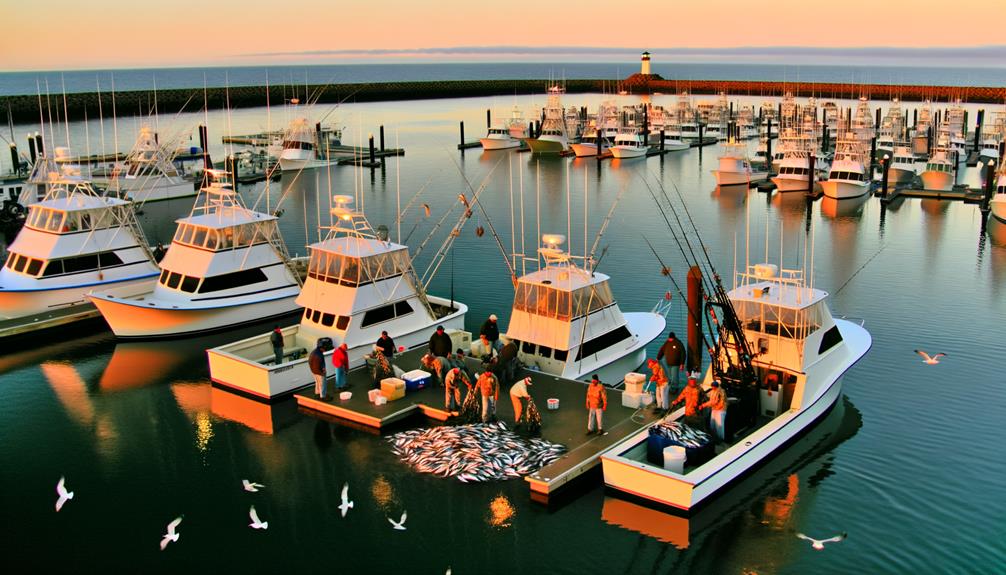Sure, you've heard the old joke that the best way to make a small fortune in fishing is to start with a large one, right? Well, let's debunk that myth right now.
As a potential fishing charter owner, you're probably curious about how much money you could make. It's a fair question and one that's not as straightforward as it might seem. Many factors come into play, including location, type of fishing, and, of course, the number of charters you run.
So, are you ready to dive deeper into the financial currents of the fishing charter business? Let's set sail and explore.
Key Takeaways
- The location of the fishing charter business and the type of fishing offered are important factors that can affect the profitability of fishing charters.
- Running a higher number of charters per year is necessary to make a profit, as trip expenses such as bait, fuel, and boat maintenance costs need to be covered.
- Offering different types of trips can attract a broader customer base and increase revenue streams, while repeat customers contribute to steady income.
- Starting a fishing charter business involves significant expenses, including the cost of a charter boat, dockage, insurance, and business licenses. However, with proper planning and market research, it can be a viable venture.
Understanding Fishing Charter Economics
Diving into the economics of fishing charters, you'll find that these businesses can reel in about a 25% profit margin, with the potential to net annual earnings of $34,300 if they operate 200 days a year. The financial success of your fishing charter depends largely on how often you run trips per year.
The startup expenses may seem overwhelming, especially with the cost of a boat reaching over $41,000. However, the way a charter business makes money can offset these costs. Consider an offshore fishing charter: a trip accommodating 18 people at $140 per person for 8 hours can yield $2,000 per trip. This can result in an annual profit around $100,000.
The trip costs the business varies by region and the type of fishing offered. For instance, in high-demand tourist areas like Destin, Florida, charters can charge between $165 to $200 per hour. Offering other types of charters, like the flat rate of $750 for an 8-hour charter in Milwaukee, Wisconsin, can increase profit margins.
These factors, combined with your dedication, can turn your love for fishing into a profitable venture.
Annual Profits of Fishing Charters
When it comes to the annual profits of fishing charters, a well-managed business can reel in a hefty 25% profit margin, translating to around $34,300 if they're casting lines 200 days a year. Understanding how much do fishing charters make is crucial for those looking to join the Fishing Charter Business.
To maximize your profits, you should aim to run more trips per year. However, be mindful of the trip expenses you incur. These include bait, fuel, and boat maintenance costs. They make a significant dent in profits, so keeping these low is key.
Profits aren't just about the number of trips. Your charter business should earn from additional revenue streams. Offering different types of trips, such as deep-sea exploration or eco-tours, can appeal to a broader customer base.
Lastly, remember that the fishing charter business makes a lot from repeat customers. Providing exceptional service to ensure customer satisfaction is a surefire way to secure these steady revenue streams.
The Viability of Charter Fishing Business

Building upon the potential profits of a fishing charter business, it's crucial to assess the viability of such an enterprise by considering the various expenses, income sources, and market factors that influence its financial success.
Starting a fishing charter business involves significant expenses. The cost of a charter boat, dockage, insurance, and business licenses can total tens of thousands of dollars. To make a profit, you'll need to run more trips per year, charging customers for each trip.
Your income as a fishing guide can vary greatly. In high-demand tourist areas, you could make up to $400 a day. However, on average, a professional fishing guide makes around $55,000 per year.
Here's a breakdown of potential earnings and expenses for a fishing charter business:
| Potential Earnings | Trips Per Year | Approximate Expenses |
|---|---|---|
| $34,300 | 200 | Varies |
| $55,000 | Varies | $30,000 (Boat Maintenance) |
| $100,000 | 50 | Varies |
Steps to Launch a Fishing Charter
To set sail on your own fishing charter business, you'll first need to weigh the considerable startup costs, including boat purchase, dockage, insurance, and licensing fees, among other expenses. It's a significant undertaking, and the financial obligations of a charter business are significant.
Here are the first three key steps to launch a fishing charter:
- Boat Purchase and Licensing: You'll need a sturdy fishing boat and a captains license from the US Coast Guard. These two factors alone can make or break your business.
- Insurance and Dockage: In addition to the boat, you'll need to secure insurance and a place to dock. These costs can add up quickly.
- Setting Your Pricing: You'll need to research what other captains charge in your area. This will be a major factor in how often you can run trips and how much profit you can expect to make.
Maximizing Charter Business Revenue

Understanding the nuances of pricing strategy in your region is the first step towards maximizing your fishing charter business revenue. This allows for the incorporation of additional charges for extended trips or add-on experiences. Fishing charter businesses take people out to sea for a unique experience, and you can capitalize on this by offering additional services that customers value.
A well-run fishing charter business often diversifies its revenue streams. Consider running more trips per day or offering different types of charter experiences, such as sightseeing or water sports. This diversification may require additional certifications and amenities on your boat, but the potential increase in revenue can justify the investment.
Optimizing your marketing to target customers effectively is another key strategy. Remember, fishing charters offer not just a boat trip, but an experience. Tailor your trips to your customers' preferences and use digital marketing to reach your target market.
Frequently Asked Questions
Is Charter Fishing Business Profitable?
Yes, a charter fishing business can be profitable. Consider factors like business sustainability, profit margins, investment returns, risk assessment, revenue sources, seasonal earnings, operational costs, charter pricing, market competition, and customer retention.
Is Charter Fishing Worth the Money?
Yes, charter fishing's worth your money. You'll save on equipment costs, benefit from experienced guides, catch unique species, relax, and network. Seasonal pricing and sustainable practices add value, especially for beginners. It's more than just fishing!
How Much Can You Make Owning a Charter Boat?
You'll consider boat maintenance costs, charter licensing fees, and staffing expenses. Your profit margin depends on customer acquisition strategies, seasonal income fluctuations, and sustainable fishing practices. Don't forget boat insurance, marketing, and tax costs.
Is It Hard to Start a Fishing Charter Business?
Starting a fishing charter business involves business registration, license acquisition, hefty equipment costs, and market research. You'll face challenges in client acquisition, adhering to safety regulations, hiring crew, maintaining your boat, and navigating seasonal fluctuations.
Conclusion
Venturing into the fishing charter business can be a profitable journey, with potential annual profits reaching around $34,300. Success isn't guaranteed, it's hard-earned – hinging on your location, pricing, and customer satisfaction.
So, roll up your sleeves, dive into the deep waters of this industry and cast your net wide. With precise planning and execution, you might just reel in a bountiful catch. Remember, in this ocean of opportunity, your profits are only as limited as your horizon.
